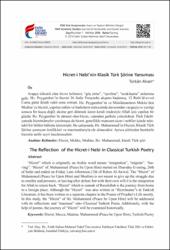Hicret-i Nebî’nin Klasik Türk Şiirine Yansıması
Citation
ALVAN, Türkân. "Hicret-i Nebî’nin Klasik Türk Şiirine Yansıması." FSM İlmî Araştırmalar İnsan ve Toplum Bilimleri Dergisi, 7 (2016):1-31.Abstract
Arapça kökenli olan hicret kelimesi; “göç etme”, “ayrılma”, “uzaklaşma” anlamına
gelir. Hz. Peygamber’in hicreti 26 Safer Perşembe akşamı başlamış, 12 Rebiʿül-evvel
Cuma günü ikindi vakti sona ermişti. Hz. Peygamber’in ve Müslümanların Mekke’den
Medine’ye hicreti; yapılan zulüm ve baskıların neticesinde davasından vazgeçiş ve yenilgi
sonucu bir kaçış değil; aksine geri dönmek üzere kendi iradesiyle Allah için yapılan bir
göçtür. Hz. Peygamber’in sünneti olan hicret, vatandan gurbete yolculuktur. Türk Edebiyatında
hicretnâmeler yazılmışsa da hicret, genellikle manzum siyer-i nebîler içinde müstakil
bir bölüm hâlinde işlenmiştir. Bu çalışmada, Hz. Muhammed’in Hicreti; Klasik Türk
Şiirine yansıyan özellikleri ve mazmunlarıyla ele alınacaktır. Ayrıca şiirlerden hareketle
hicretin tarihi seyri incelenecektir. “Hicret” which is originally an Arabic word means “emigration”, “migrate”, “leaving”.
“Hicret” of. Muhammed (Peace be Upon Him) started on Thursday Evening, 26th
of Safar and ended on Friday Late-Afternoon,12th of Rabee Al-Awwal. The “Hicret” of
Muhammed (Peace be Upon Him) and Muslims is not meant to give up the struggle due
to cruelity and pressure, or leaving after defeat; but with their own will it is the emigration
for Allah to return back. “Hicret” which is sunnah of Rasulullah is the journey from home
to a foreign place. Although the “Hicret” was also written in “Hicretname”s in Turkish
Literature, it has been written as a separate chapter in the Poems of Prophet’s Life mostly.
In this study, the “Hicret” of Hz. Muhammed (Peace be Upon Him) will be addressed
with its reflections and “mazmun” onto Classical Turkish Poem. Additionaly, with the
help of poems, the journey of “Hicret” will be examined historically.



















